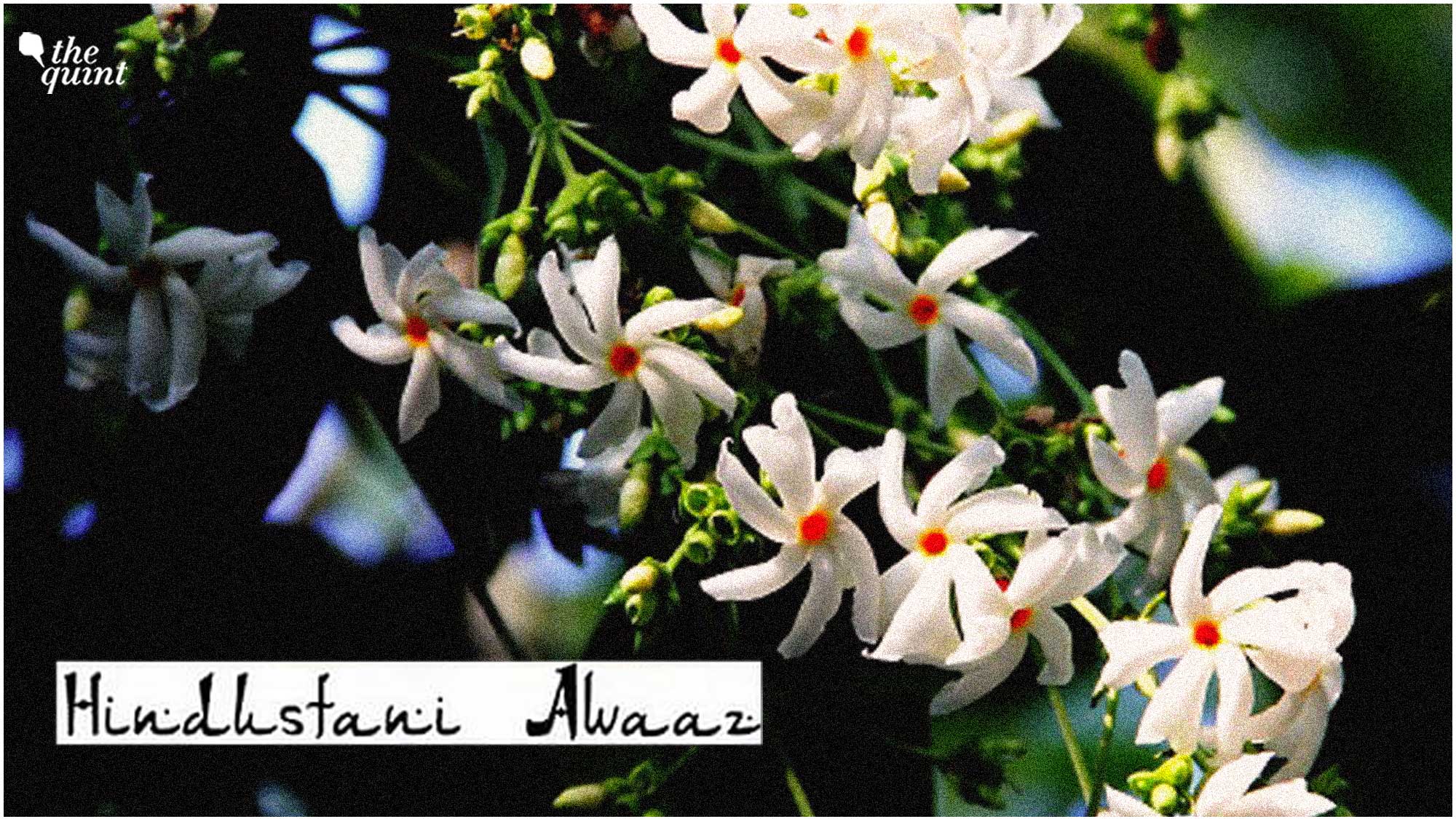Over the next few days, the last of the Harsingaar flowers will be gone. For the past two months, they have been making their presence felt with their tremulous beauty and intoxicating fragrance.
Come December, and the tree will go back to being a perfectly ordinary one neither too big nor especially handsome, its leaves too simple and unremarkable— its bark a dull grey. But for the few months of its flowering from late September till the end of November, it becomes a thing of rare beauty and a joy to behold.
These white-petalled, orange-stemmed flowers open at dusk, release their fragrance all night long and are shed by dawn. When one wakes up in the morning, the ground beneath the tree is carpeted with these upturned white flowers with their bright orange stalks, their heady fragrance still permeating the air.
Harsingaar Heralds Festivities
Their appearance in late September marks the nip in the air, the onset of short days and long nights and Durga puja celebrations. As a matter of fact, the flower happens to be the official flower of the state of West Bengal.
Native to South Asia, the flowering tree grows all over India and is known by many names: Night Flowering Jasmine, Parijat, Sheuli, Shifali. Sometimes also referred to as the 'Tree of Sorrows' because its flowers fall and wilt with the first rays of the sun, it has great symbolic value too.
As Parijat, it appears in several mythological and sacred texts. There are references to it having appeared from the Samudra Manthan (Churning of the ocean.) It is said that Krishna’s favourite wife Satyabhama demanded the tree be planted in the backyard of her palace. And yet when the tree flowered, its blooms fell in the adjacent backyard of Rukmini—Krishna’s first wife!
Harsingaar’s Many Charms
Almost every part of the tree has medicinal value and is highly regarded in Ayurveda. Vastu too considers the Parijat an auspicious tree, a harbinger of prosperity and happiness. In earlier times, the vivid orange of its stalks was used to colour clothes; I tend to sun-dry the stalks and use them to fleck my biryanis.
Given its many benefits, its symbolism, and its own delicate beauty, how could the Urdu poet have remained immune to its charms? Indeed, it appears time and again as an embodiment of transience, a beauty that is destined to fade, a symbol of purity that is almost other-worldly.
Here is Iftikhar Arif— a pre-eminent modern poet invoking the Haar-singhaar flowers as witnesses to a love that is just as fleeting as the fragrance of these flowers in his nazm ‘Hawain Anpadh Hain’ (’The Winds are Illiterate’):
Ab ke baar phir
Mauj-e-bahar ne
Farsh-e-sabz par
Saat-e-mahr mein
Har-singhar se
Hum donon ke naam likhe hain….
(Once again
The ecstasy of spring
Has written both our names
In a moment of love
On the green ground
With harsingar flowers)
Azra Naqvi evokes the harsingar as a symbol of a beauty that is so overwhelming that it cannot survive the harshness of reality an in her nazm titled ‘Haar-singhaar’. She remembers the harsingar tree from her childhood at the far end of her family home; the tree is gone, replaced by a high-rise building:
Tum ne dekhe hain kabhi har-singhaar
Woh dil-avez se maasum se do-range phuul
Raat ko shaḳh pe khilte thhe sitaron ki tarah
Woh bhala din ki tamazat ke sitam kyuun sahte
Iss liye aḳhir-e-shab apne hi husn se be-ḳhud ho kar
Ose se bheege hue farsh pe kis pyaar se bichh jaate the
(Have you ever seen the harsingar
Those captivating, innocent, two-coloured flowers
They would bloom on the branches at night like stars
How could they tolerate the intense heat of the day
Enraptured by their own beauty in the last watch of the night
They would carpet the dew drenched ground with such love)
Others too have commented on this night-blooming flower that withers at the first rays of the sun, such as in this sher by Bharatdeep Mathur Deep:
Unhen qubul nahin aftab ki daawat
Jalega deep to phulenge har-singaar ke phuul
(They cannot accept the invitation of the sun
The harsingar will bloom when lamps are lit)
In a long, beautiful poem titled ‘Aadhi Raat’ Firaq Gorakhpuri recreates the sights, sounds, and scents in the dead of night when everything is covered by a blanket of sleep, the flowers have covered their faces, the stars too seem dull and distant, nothing stirs; only the flower-laden harsingar tree seems alive, releasing a heady burst of fragrance into the cool, still night:
Kharha hai ose mein chup-chap har singar ka perh
Dulhan ho jaise haya ki sugandh se bojhal
(The harsingar tree stands silent in the dewy night
Like a bride weighed down by the fragrance of modesty.)
At a time when high-end uber-luxe companies selling indie beauty products, build on the evocative power of words, the parijat and the harsingar are being used as a “brand” for body mists, after-bath oils, silkening body powders, et al in a bid to bottle this elusive fragrance. Called by different names, this white and orange flower is inextricably intertwined with nostalgia, with memories of a distant childhood, with homes that once had a harsingar tree in their sehn (backyard).
For those living in concrete jungles in cities, this flower-laden tree is a symbol of a lost age. It is only appropriate, therefore, that the harsingar tree is often planted beside the grave of a loved one. Begum Akhtar’s grave in Pasand Bagh, Lucknow, too has a harsingar tree that sheds its fragrant load over the begum sleeping the eternal sleep.
(Rakhshanda Jalil is a writer, translator and literary historian. She writes on literature, culture and society. She runs Hindustani Awaaz, an organisation devoted to the popularisation of Urdu literature. She tweets at @RakhshandaJalil. This is an opinion piece and the views expressed above are the author’s own. The Quint neither endorses nor is responsible for the same.)
